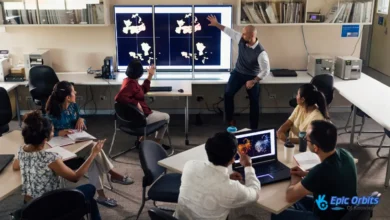Electrical and Electronics Engineering Career Insights
Electrical and electronics engineering focuses on the study and application of electricity, electronics, and electromagnetism.

Regarding electrical and electronics engineering, what is ahead? With its work in circuit design and power systems, this discipline has revolutionized our planet. One must grasp the present situation and required competencies for success. With more than 510K employees and over 8030 enterprises supported worldwide, the global electrical engineering sector clearly shows a rising need for engineers.
Surrounded by complex diagrams and schematics on clear panels with a clean and contemporary style, a future electrical and electronics engineering laboratory, with sophisticated circuitry, robotic components, and digital screens, lit by soft LED lights, looks.
Examining electrical and electronics engineering requires us to consider the effects of new technology. How will they shape our field and provide opportunities and difficulties? There are many opportunities in the industry; hence, the correct abilities are very important.
The Development in Modern Industry of Electrical and Electronics Engineering
Over time, the discipline of electrical and electronics engineering has evolved greatly. Changing industrial demands and new technologies help to explain this trend. Electronic gadgets, signal processing, and telecommunication are increasingly used nowadays.
The sector is headed toward depending more on many sources of electricity than just large-scale facilities. Of newly generated electricity, around forty percent comes from solar and wind sources. This is true because, in 10 years, solar technology has improved greatly, and solar systems now cost seventy to eighty percent less.
New technologies altering electrical and electronics engineering include IoT, artificial intelligence, and 5G. Manufacturing 20–30% more efficiently is a result of robots and automation. They also about 40% reduce hazards and injuries.
By up to 30%, artificial intelligence and machine learning assist forecasts when items require repairing, hence reducing downtime. They also help to simplify maintenance.
The digital revolution is influencing many sectors. Finding sufficiently qualified engineers is a major obstacle. According to EETech research, 72% of young engineers want to work on embedded development. Expert designers, meanwhile, pique most interest in analog design.
Fundamental Competencies for Future Leaders in Electrical and Electronics Engineering
Future electrical and electronics engineers must combine soft and technical abilities if they are to be successful. Key knowledge is regarding control systems and renewable energy sources. Furthermore, higher studies depend on a solid mathematical background—especially in calculus.
Electrical engineers have to be adept in programming and understanding circuits and be able to troubleshoot. One should be aware of digital technologies and programming languages like Java and C++. Engineers who just concentrate on tech abilities, however, find it difficult to get work. This emphasizes the need for soft skills such as cooperation, problem-solving, and communication.
- Constant learning and adaptation.
- inventive thinking and problem-solving.
- Good communication and cooperation.
- Time management and leadership.
- Customer service and emotional intelligence.
Future engineers equipped with these abilities will shine in a quickly changing environment. In electrical and electronics engineering, particularly in renewable energy systems and control systems, they may significantly influence things.
Key skills for modern engineering roles are critical for success. Technical skills are highly important, requiring proficiency in areas such as renewable energy systems and control systems. Soft skills are equally crucial, including effective communication, teamwork, and problem-solving. Adaptability is also essential, enabling engineers to adjust to rapid technological advancements and evolving client requirements.
Learning Circuit Design and Power Systems: Your Basis for Future Work
With an expected 8% additional employment by 2025, the need for electrical engineers is quickly rising. Learning the foundations of electrical and electronics engineering is very vital. This covers modern circuit design, power systems, and green energy alternatives. Success depends on knowing how to create circuits, control power systems, and operate with electronic tools.
Using technologies like SPICE and MATLAB and mastering circuit analysis, electrical engineers also have to grasp control systems and semiconductors. This understanding facilitates control of energy and power flow. Engineers have to find solutions for storing energy and maintaining power quality as more people pay more attention to green energy.
Modern Circuit Design Methodologies:
- command of circuit analysis and simulation tools.
- Knowledge of power electronics and semiconductor devices.
- Control system knowledge and stability analysis awareness.
Engineers may overcome challenging challenges by shining in circuit design, power systems, and electronics. Given the drive toward sustainability and renewable energy, this is particularly true. By using energy-saving techniques and simulation technologies, engineers may become more helpful and assist in inspiring fresh concepts.
In electrical engineering, certain skills are especially critical. Circuit analysis is of high importance, forming the foundation for understanding and designing electrical systems. Power electronics holds medium importance, essential for specific applications involving energy conversion and management. Control systems are also highly important, enabling the design and regulation of dynamic systems across various engineering fields.
Changing Into Renewable Energy Systems: The Green Revolution
One rapidly expanding industry is renewable energy. This is so we may consume fewer fossil fuels and reduce carbon emissions. Key in this movement are electrical and electronics experts. They create green energy power solutions, including solar panels and wind turbines.
Renewable energy depends much on signal processing. It guarantees the generation, transmission, and wise use of energy.
Several significant opportunities in renewable energy consist of:
- Leading the way toward a cleaner future are solar and wind technologies.
- With improved management, smart grids use energy consumption up to 30% better.
- New designs and technology in energy-saving buildings help to minimize energy usage by up to 50%.
Signal processing will become much more crucial as we shift to renewable energy. It will assist in improving energy consumption. By 2025, the green tech and sustainability industry is estimated to reach over $2.5 trillion. This implies several opportunities for development in renewable energy as well as fresh concepts.
Automation and Robotics: The Frontier Not Too Far
Looking forward, several sectors will be much influenced by robots and automation. Up to 2025, the robotics sector is projected to increase by 26% annually. Over 3.6 million industrial robots will be running all over by then. Furthermore, sixty percent of firms want to use automation tools.
Robotics is significantly changing the healthcare scene. Surgeons now make 20% fewer mistakes as a result. In manufacturing, automation might increase output by twenty to forty percent or more. Electronics and electrical engineers have to maintain current. They have to learn how to create robotic control systems capable of handling challenging jobs.
- Of students studying electrical engineering, 75% are learning about robots.
- One in five graduates in electrical engineering land in robotics.
- Electrical engineering and robotics will provide approximately 150,000 jobs by 2025.
- By 2025, the worldwide robotics industry is expected to reach $210 billion.
Automation technology and robots are quickly becoming more important. Many sectors will be shaped going forward in major part by this field. Learning new skills and following trends and technology helps electrical and electronics engineers to flourish.
Signal processing and telecommunications: constructing networks of tomorrow
Our access to information and our communication depend on technology. Important in this field are electrical and electronics engineers. They design methods and techniques meant for effective data transfer. The need for these engineers is rising since 5G and 6G are just around the corner.
Signal processing and telecommunications have several important uses, including
- Wireless networks of communication.
- network protection.
- Internet of Things (IoT) devices.
Reliable data transmission in these devices depends on sophisticated signal processing. Engineers in electronics and electrical lead in creativity. They propel fresh apps and technologies.
Faster, more dependable networks result from developments in signal processing and telecommunications. Among several sectors, including banking and healthcare, this will affect It will also increase artificial intelligence and IoT applications. Looking forward, the world of tomorrow depends critically on signal processing and telecommunication.
Occupational Routines in Electrical and Electronics Engineering
Electronics and electrical engineering provide a lot of job options. These include robotics, telephony, and circuit design. Knowing several disciplines, pay scales, and certifications helps engineers map their futures.
In electrical and electronics engineering, one might find great pleasure. Electrical engineers earn $103,500 annually; electronics engineers make roughly $102,700. From 2022 to 2032, the employment prognosis is strong: 3% for electrical engineers and 5% for electronics engineers.
For these engineers, top sectors include manufacturing, research, and telecommunications. About seventy percent of them pursue these disciplines. About 7% of them work for the federal government.
Beginning pay for these engineers falls between $62,000 and $75,000. This depends on the field and site. Experience will help them to make up to $103,500 annually.
For these engineers, professional certificates increase employment possibilities. Among the top positions are those of programmers, software developers, and electrical and electronics engineers. Engineers may flourish in many disciplines with the appropriate credentials and abilities.
Constructing Your Professional Portfolio: From Idea to Reality
Knowing power systems and electronic gadgets is very vital for both electrical and electronics professionals. Still, knowledge of theory is insufficient. Real shining in your profession requires actual experience. A professional portfolio helps you to highlight your knowledge and abilities in this regard.
Your portfolio could include many initiatives, like creating power systems or technological equipment. It could also display any relevant certifications, including those from the Institute of Electrical and Electronics Engineers (IEEE). Your practical expertise will attract top organizations.
Here are several strategies to enhance your portfolio and gain valuable experience:
- Show your knowledge of power systems and electrical gadgets by participating in hackathons and coding competitions.
- Work on your projects, including developing and manufacturing your own electronic tools.
- Work on projects including renewable energy systems in tandem with other engineers.
- Help with engineering initiatives in your neighborhood, such as nonprofit power system maintenance.
Following these ideas and creating a solid portfolio can increase your prospects in the field of electrical and electronics engineering. Never stop studying and showcasing your power system and electrical gadget prowess.
Key areas in electrical engineering focus on both practical skills and professional credentials. Power systems involve the design and development of electrical networks, including renewable energy projects. Electronic devices cover the design and development of components such as microcontrollers and embedded systems. Certifications, like those from the Institute of Electrical and Electronics Engineers (IEEE), validate expertise and enhance career prospects in the field.
Conclusion
Electrical and electronics engineering is an ever-evolving profession. For those with the bravery to innovate, it presents many opportunities. Leading in future energy systems, artificial intelligence, robots, and more will be electrical engineers.
Skilled electrical engineers are in more demand than ever. This increased demand is due to the need for green solutions and rapid technological advancements. You could design smart gadgets, upgrade power systems, or work on novel technologies. The options are expansive.
To succeed, pay close attention to your technical abilities and follow fresh trends. Also hone your capacity for problem-solving. This will help you secure a meaningful job that significantly impacts the world.
Starting your career in this fascinating discipline enables you to contribute to shaping the future. Accept the challenge, use your imagination, and assist in major transformation. You are able to transform the earth. Go outside and start it!



